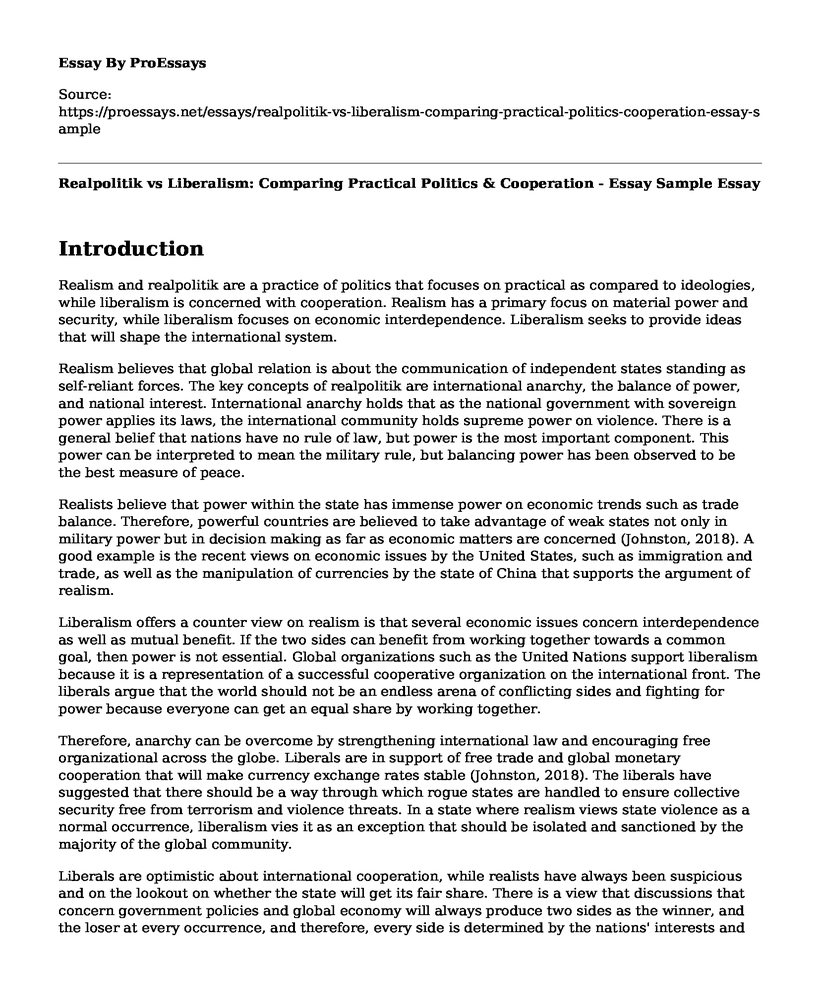Introduction
Realism and realpolitik are a practice of politics that focuses on practical as compared to ideologies, while liberalism is concerned with cooperation. Realism has a primary focus on material power and security, while liberalism focuses on economic interdependence. Liberalism seeks to provide ideas that will shape the international system.
Realism believes that global relation is about the communication of independent states standing as self-reliant forces. The key concepts of realpolitik are international anarchy, the balance of power, and national interest. International anarchy holds that as the national government with sovereign power applies its laws, the international community holds supreme power on violence. There is a general belief that nations have no rule of law, but power is the most important component. This power can be interpreted to mean the military rule, but balancing power has been observed to be the best measure of peace.
Realists believe that power within the state has immense power on economic trends such as trade balance. Therefore, powerful countries are believed to take advantage of weak states not only in military power but in decision making as far as economic matters are concerned (Johnston, 2018). A good example is the recent views on economic issues by the United States, such as immigration and trade, as well as the manipulation of currencies by the state of China that supports the argument of realism.
Liberalism offers a counter view on realism is that several economic issues concern interdependence as well as mutual benefit. If the two sides can benefit from working together towards a common goal, then power is not essential. Global organizations such as the United Nations support liberalism because it is a representation of a successful cooperative organization on the international front. The liberals argue that the world should not be an endless arena of conflicting sides and fighting for power because everyone can get an equal share by working together.
Therefore, anarchy can be overcome by strengthening international law and encouraging free organizational across the globe. Liberals are in support of free trade and global monetary cooperation that will make currency exchange rates stable (Johnston, 2018). The liberals have suggested that there should be a way through which rogue states are handled to ensure collective security free from terrorism and violence threats. In a state where realism views state violence as a normal occurrence, liberalism vies it as an exception that should be isolated and sanctioned by the majority of the global community.
Liberals are optimistic about international cooperation, while realists have always been suspicious and on the lookout on whether the state will get its fair share. There is a view that discussions that concern government policies and global economy will always produce two sides as the winner, and the loser at every occurrence, and therefore, every side is determined by the nations' interests and values. Analysts view that the current state would not allow liberals to function seamlessly because there are so many parties with divergent interests that cannot be forced to share a standard view. A good example is a state where creditors cooperate, but that does not offer a solution because it shifts the load to the debtors who may not agree, thereby making politics polarized.
As a result, several political movements have broken out across the world that is opposed to the current views towards solving the deadlock among global political economies (Whelan, 2004). On one side is a group of creditors holding together with their allies in government across the globe who oppose any solution that will enable the provision of grant debts at the cost of creditors. However, on the other hand, private and public debts have accumulated at an alarming rate because they are cheap and do not influence the global economic meltdown.
The challenges of liberal and realist world economy will not be solved through cooperation as they will accumulate to a polarization point where the rich and the poor, as well as opposing interests, break down (Whelan, 2004). Politics is about interests, and every side supports views with the belief that in the long run, they will come out with an upper hand. The current trend in global politics has made it very difficult for sides to agree on one way towards unlocking the current economic deadlock.
References
Johnston, W. (2018). REALISM AND THE LIBERAL TRADITION: international relations. [Place of publication not identified], PALGRAVE MACMILLAN. DOI: 10.1057/978-1-137-57764-1
Whelan, F. (2004). Hume and Machiavelli: political realism and liberal thought. Lanham, Md Lexington Books. DOI: 10.1353/hms.2011.0217
Cite this page
Realpolitik vs Liberalism: Comparing Practical Politics & Cooperation - Essay Sample. (2023, Mar 18). Retrieved from https://proessays.net/essays/realpolitik-vs-liberalism-comparing-practical-politics-cooperation-essay-sample
If you are the original author of this essay and no longer wish to have it published on the ProEssays website, please click below to request its removal:
- The Ministry of Transportation in Canada Paper Example
- The Fifth Amendment - Essay Sample
- Essay on Public Health: Challenges and Policy Issues
- Essay Example on Securing Human Rights: Government Measures Against Terrorism
- Essay on Intergovernmental Management: Improving Living Standards in the 21st Century
- Essay Example on Trump's 2017 NSS: A Roadmap for US Prosperity & Security
- Spanish Parliamentary Monarchy: A Brief Overview - Essay Sample







